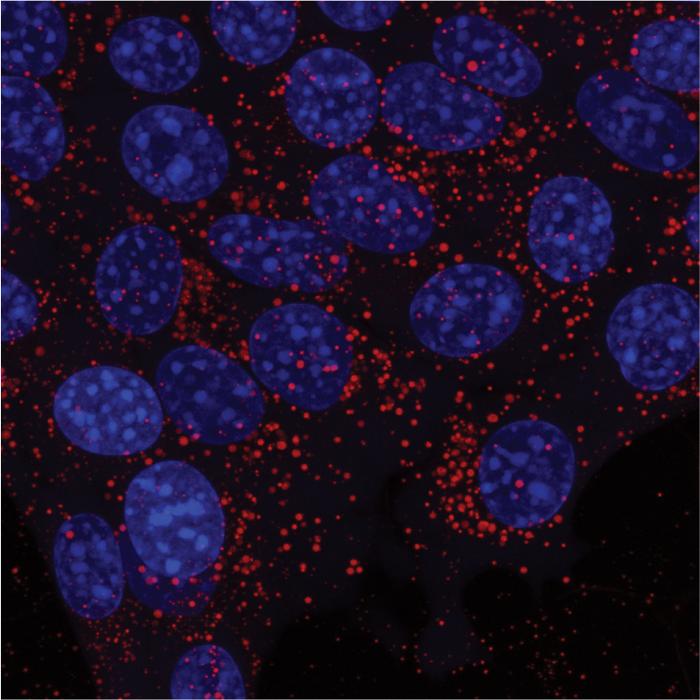A metabolic ‘survival switch’ controlled by the stiffness of triple-negative breast tumours can significantly influence how successfully their cancerous cells spread to other organs, according to new findings from the Garvan Institute of Medical Research.

Credit: Dr Elysse Filipe / Garvan Institute
Softer tumours fuel more aggressive spread of triple-negative breast cancer
Researchers have discovered how the mechanical properties of tumours can prime cancer cells to better survive their spread to other organs.
A metabolic ‘survival switch’ controlled by the stiffness of triple-negative breast tumours can significantly influence how successfully their cancerous cells spread to other organs, according to new findings from the Garvan Institute of Medical Research.
The study in cell and mouse models showed that softer tumour environments, typical of early-stage cancer, can prime triple-negative breast cancer cells to use an extra energy source for survival during metastasis. The research suggests that drugs targeting this altered cancer cell metabolism could boost treatments for metastatic triple-negative breast cancer.
“Our research suggests triple-negative breast cancer cells in soft tissue environments are ‘primed’ to better survive the spread to other organs and that they switch on an alternative form of metabolism to do so,” says Associate Professor Cox, Head of the Matrix & Metastasis Lab at Garvan and senior author of the study published in Advanced Science.
“This suggests that triple-negative breast cancer cells spreading from softer tumours are more aggressive, and drugs that target cancer cell metabolism may benefit patients with metastatic triple-negative breast cancer treatment.”
A metabolic survival advantage
Triple-negative breast cancers are highly aggressive and difficult to treat as they lack three receptors (for oestrogen, progesterone and the HER2 protein) that can be targeted in other breast cancers. New treatment options are urgently needed for the 2,500 women diagnosed every year in Australia alone.
Using biomaterials that mimic the properties of tumours, the team investigated how triple-negative breast cancer cells respond to the physical stiffness of their environment. The researchers found the cancer cells were primed to be more resilient when grown in soft environments and, when injected into mouse models, up to 11.8 times more likely to metastasise to new sites compared to those from rigid tumour environments.
The team also discovered that soft environments altered the cancer cells’ preference for ‘fuel’ in a way that enhanced their durability while travelling through the body. These primed cells metabolised glucose – the preferred energy source for cancer cells – but they also stockpiled lipids as internal fuel reserves and in turn ramp up lipid metabolism – a more resilient energy pathway for their journey from a primary tumour site.
“This switch to using both glucose and fats as an energy source equips cells to better survive the mechanical stresses of travelling through the blood stream and seeding new tumour sites throughout the body,” says first author Dr Elysse Filipe, who completed the study as a postdoctoral researcher at Garvan. “By blocking lipid metabolism in triple-negative breast cancer cells, we were able to ‘starve’ their high energy demand and reduce metastasis in a cell model.”
A new approach for triple-negative breast cancer
“Our findings highlight that the physical properties of triple-negative breast cancers, which vary dynamically as the cancer progresses, profoundly impact the cancer’s ability to spread,” says Dr Filipe. “These findings reveal a vulnerability of triple-negative breast cancers – the metastasising cells’ reliance on diverse fuel sources to meet their high energy demands.”
Associate Professor Cox adds: “The study underscores the importance of considering the mechanical diversity within and between tumours when designing new treatments for aggressive cancers. We now plan to explore whether pairing targeted metabolic inhibitors with existing therapies could limit metastasis and improve outcomes for triple-negative breast cancer patients.”
–ENDS–
This research was supported by Australia’s National Health and Medical Research Council, Cancer Council NSW and an Australian Government Research Training Program Scholarship.
Associate Professor Cox is a Conjoint Associate Professor at St Vincent’s Clinical School, Faculty of Medicine and Health, UNSW Sydney.
Journal
Advanced Science
Method of Research
Experimental study
Subject of Research
Animals
Article Title
Tumor Biomechanics Alters Metastatic Dissemination of Triple Negative Breast Cancer via Rewiring Fatty Acid Metabolism
Article Publication Date
11-Apr-2024



